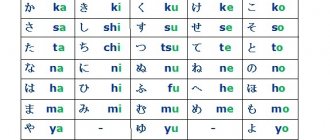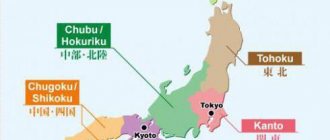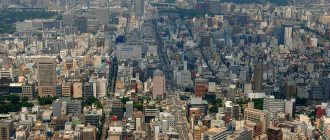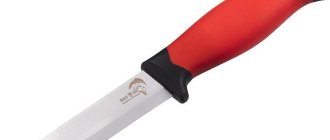There are practically no Russian universities in international educational rankings. But there are many Japanese higher education institutions there, and Tokyo and Kyoto Universities in Japan are consistently among the top 100 best. At the same time, the cost of studying there is an order of magnitude lower than at universities in the USA and Great Britain, and there is even a system of discounts and exchange programs for foreign students.
The highest rating in 2021 is from Moscow State University named after M.V. Lomonosov. He is in 174th place.
What the education system looks like in the Land of the Rising Sun, why it is considered one of the best in the world and what opportunities do Russian students have to study at universities in Japan - you will learn about all this from the article.
And to be the first to receive the latest news from the world of education, subscribe to our information resource. And don’t forget to take advantage of promotions and discounts.
Japanese education system
As in most countries, education in Japan is divided into preschool, school and higher education. After graduating from university, you can continue your studies - enroll in graduate school and then doctoral studies. However, it is worth considering that in Japan, with a population of 127 million, there are only 2.8 million students, which is almost three times less than, for example, in Russia, where the population is 20 million more. Therefore, enrolling in a Japanese university requires enormous efforts and, of course, financial costs.
In order to “settle” in life in the future, children are accustomed to constant mental and physical labor from elementary school. Starting in the 4th grade (upon reaching the age of 10), schoolchildren in Japan take exams, since students are not automatically promoted from class to class. Therefore, in order to successfully move up the school “career” ladder, children try to regularly attend additional education centers - the so-called juku. Many schoolchildren and students are also undergoing distance learning.
Preschool education: nursery and kindergarten
Preschool education in Japan is not compulsory until the age of three. Kindergartens, mostly private, are divided into so-called authorized ones, which meet the highest educational standards, and unsanctioned ones. In the first, oddly enough, tuition fees are lower, since they are actively supported by the state and local authorities, so the queues are huge.
Depending on the age of the child, preschool institutions are divided into two types: hoikuen (nursery) - for children from 10 months to three years old and yochien (kindergarten) - for children from three to six years old. To send a child to hoikuen, parents must submit documents indicating that they cannot study with the child at home. This could be a certificate from the place of work or confirmation of a serious illness of the father or mother.
Yochien is a mandatory stage in a child’s education, which is why some kindergartens are created at schools and even universities.
Japanese children are “decided” on their future profession from an early age. Therefore, if potential migrants are interested, for example, in teaching children to draw in Japan, they should try to enroll their child in an elite kindergarten with a creative program. To enroll in such a yochien, children will have to pass mini-exams, and parents will have to generously pay for tuition (a regular kindergarten will cost $100-300, and an elite one will cost $1,500 per month, not counting fees for excursions).
School education
The school education system in Japan involves dividing the learning process into three stages. This division is common for immigrants from the CIS countries. Japanese children from 6-7 to 17-18 years old must attend three “schools”:
- primary;
- average;
- senior (formally attendance is not required, but after high school only 6% of students leave).
The general education program is designed for 12 years. How many grades in school a student has to complete depends on his own decision. For example, if a teenager decides not to enroll in high school and continue his studies in college, he only needs to complete 9 grades (that is, study 6 years in elementary school and 3 years in high school). Therefore, it is not difficult to calculate at what age Japanese schoolchildren graduate from school: if they completed 12 grades, then at 17 or 18 years old. Those students who went to local colleges or schools will already receive a diploma by age 18.
Speaking about how schools are organized in Japan, it should be noted that the school year here is divided into trimesters and begins on April 1, which is difficult for migrants to get used to. Another “strange thing”: every year the child’s classmates and teachers change. The Japanese believe that constant “shuffling” within groups helps schoolchildren to socialize and better find a common language with new people. But the holidays will not be something unusual for residents of the CIS - children here rest in winter, spring and, most of all, in summer, and study from Monday to Friday (in some schools, including Saturday).
Junior or primary school in Japan
Primary, or junior school, introduces children to basic disciplines. The list of required subjects for all subjects is as follows:
- Japanese language;
- calligraphy;
- mathematics;
- music;
- World Art;
- physical training;
- LIFE SAFETY FUNDAMENTALS;
- work.
Children with disabilities can receive inclusive education in primary school, that is, master the program together with physically healthy students. If desired, parents can send their special child to a specialized institution. In such educational institutions, schoolchildren can study anything - from secular ethics to the general theory of health.
The cost of such training will be approximately the same as in any private school - about $3,500 per year, not counting the entrance fee (up to $1,800) and expenses for excursions and textbooks.
High school in Japan
Secondary school - from 7th to 9th grade - is available to those who have successfully passed the final exams. This does not mean that a student who fails to score the minimum required number of points will be expelled from school after the 7th or 8th grade - in most cases, he will simply have to change his educational institution to a less prestigious one. This means that you will have to adapt to the new program, which each school in Japan chooses independently.
In high school, new humanities and sciences are added to study, as well as mastering a musical instrument. It is no coincidence that many children at this time begin to be interested in music school; Yamaha schools are especially popular. Local tutors train not only musicians, but also actors, however, it is expensive - about $53 for one lesson in a prestigious institution.
Also in secondary school, work with gifted children begins in earnest. For children 13-15 years old, there are many hobby groups or clubs (bukatsu), the cost of classes on average is $30 per month. Most popular destinations:
- sports (especially martial arts and baseball);
- programming;
- movie;
- photo;
- ikebana (the art of arranging bouquets).
High school in Japan
Speaking about the age at which people enter high school in Japan, let us remember: this happens mainly at the age of 14-15. By this time, schoolchildren have time to pass several exams, make friends in interest clubs and, of course, decide on their future profession. Based on the list of favorite subjects, teenagers will have to choose a specialization - the humanities or natural sciences, as well as additional subjects that will be needed to study for admission to university. Such disciplines may be:
- economics (in-depth study);
- agronomy;
- medicine;
- foreign language.
As already noted, about 6% of Japanese go to college after graduating from high school. The professions that can be obtained in these educational institutions are well known to residents of the CIS: hairdresser, cook, electrician, etc. The average cost of college is $7,000 per year, and the most expensive is to study to become a culinary specialist.
School at the Russian Embassy in Japan
Russian-speaking migrants from the CIS countries, who fear that their children will not cope with the increased workload in a Japanese school, may be interested in how the Russian school at the embassy in Japan works. There is an opinion that only children of embassy workers can be admitted to this institution, but this is not entirely true. This school can be accessed by appointment. However, the cost of training here is quite high, but renting housing will cost even more. Since the school is located in a prestigious area of Tokyo, you can rent an apartment here for no less than $1,300 per month.
There is another way for a Russian-speaking child to receive an education in Japan: exchange education for schoolchildren is available to residents of the CIS. Teenagers aged 15-18 years can take part in such programs. The duration of the program is 12 months, the cost of participation is $9,100. The school at the Russian Embassy is also involved in organizing training and finding families for accommodation.
Results
Already in kindergarten, Japanese children learn the basics of reading and writing. Compulsory education begins at age 6 and ends at age 18. It is for this reason that students from the CIS countries who wish to obtain a diploma from a Japanese university must either study for a year at a university in their homeland or take preparatory courses in Japan.
Free education is provided only in primary and secondary public schools. Starting from high school, you will have to pay for acquiring knowledge.
Getting higher education
With 94% of students planning to attend college, it appears that compulsory higher education exists in Japan. This is not actually true, but it is very close to the truth. There are a huge number of universities in the country - 728, and the competition in the most prestigious of them is prohibitive - from 20 to 200 people per place.
Education in Japan for foreigners is available on a competitive basis. In addition, a potential student must take preparatory courses in order to receive a qualifying diploma of knowledge of the Japanese language. The document must be certified by the All Japan Teachers Association and approved by the Ministry of Education.
However, it is worth going abroad for courses not only to “pull up” your language, but also to learn the specifics of studying at universities in Japan. The fact is that there are no mandatory lectures or seminars to attend - the student only has to earn 125-150 so-called credit units, and passing one test or exam is equivalent to 1-2 units. Thus, during 4-6 years of study, a student must choose subjects that interest him and master them. Cheating on exams is strictly prohibited - for this, the student will lose all credits and be expelled from the university, and the money spent will not be reimbursed.
Education for migrants from the CIS
Most universities teach in Japanese. So if you are interested, for example, in training for Kazakhstanis, you should not expect that abroad you will be able to speak your native language. Japan is an extremely closed country, and there are very few people from the CIS there (no more than 40,000 people in the entire country).
Studying for Ukrainians in Japan involves the following algorithm: first you improve your language, complete preparatory courses, and only then apply to a university. These rules are relevant for both future bachelors and graduate students.
Defense of a diploma/dissertation in any European language is permitted in exceptional cases.
However, in some cases it is still possible to get an education in Japan in English. This mainly happens in branches of US universities located in Japan (for example, Sophia University). In addition, at some universities you can take an entrance interview in English, but the training will be in Japanese.
Think about your training now
If you decide to enroll in a university in Japan, you should not postpone the issue of future studies indefinitely. The sooner you start learning Japanese, the easier and faster you will master it.
You can learn the basics of a foreign language at home, and go to Japan to improve your acquired knowledge.
And finally, we cannot help but remind you that the Japanese language opens the door to a world of limitless possibilities. The leading companies in the world are Japanese companies that are happy to invite foreign specialists who are fluent in Japanese and English to join their teams. In addition, knowledge of Japanese will help you achieve success not only in Tokyo, but also in any other country. And most importantly, speaking Japanese will be your ticket to entering a university, the diploma of which will be important in your career.
How to enter a Japanese university
The first thing you need to do before enrolling is to save up a sufficient amount of money, since it will not be possible to recoup the costs of training while working and studying at the same time. There are very few options for going to study in Japan for free: no more than 200 people a year win grants for budget places, and there are over 2.8 million students here (and only local ones, i.e. Japanese citizens).
In addition, as already mentioned, you need to take preparatory courses lasting at least two semesters, preferably in Japan itself, and then start preparing documents.
Try to immediately decide whether you intend to continue your studies in a master’s program, since there are practically no opportunities to move from one university to another after admission. Also, get proof that you have completed at least 12 years of education in your home country (for CIS residents this is usually school plus the first year of university), and feel free to submit your documents!
If you are over 18 years old and have no problems with obtaining a visa (criminal records, dangerous diseases, etc.), you will be allowed to take exams common to all foreigners, namely:
- general education exam in the humanities or natural sciences;
- Japanese language test;
- entrance internal exams;
- interview.
Applying for a study visa
A student visa to Japan is issued at the embassy or visa center if you have an invitation from at least one Japanese university. Also, to obtain a visa you need another important piece of paper - the so-called certificate from the Ministry of Justice of Japan. This document is required for anyone who plans to stay in the country for a period of more than 90 days, since it contains information about the status of the visitor (in this case, that the migrant is a student at a language school or university).
Documents for admission
To qualify for an invitation from a guarantor, you need to send documents in advance to the admissions committee of a language school or university. Do not forget that the school year in Japan begins on April 1, and if documents are sent by regular mail and not by email, you need to allow another 20-30 days for delivery. The package includes the following papers:
- statement;
- autobiographical sketch;
- school certificate;
- a college diploma or transcript from the first year of university (for those who need to “gain” 12 years of education);
- a recommendation from a teacher who taught the applicant Japanese;
- certificate of absence of dangerous diseases (HIV/AIDS, tuberculosis);
- photographs (requirements vary by institution);
- a copy of a foreign passport;
- sponsorship letter and/or bank statement.
Prestigious universities, especially medical universities, may require additional documents from applicants. So, if some lectures at the institute are given in English, TOEFL and/or IELTS certificates will be required. Details about the conditions for admission should be found on the official websites of the universities you are interested in.
Japanese visa extension
Student visas are renewed either every 6 months or once a year - usually in March-April, since this is when the academic year begins. Both visitors studying at language schools (but not more than two years in a row) and students of universities and colleges can apply for renewal. If a person has entered the university, but is not yet very confident in speaking Japanese, he can continue attending a language school in parallel with his main studies. The same practice applies to those who decide to continue their studies in graduate school and obtain a scientific degree.
Are you interested in master's programs for Russians, Ukrainians and people from other CIS countries? Then you will have to pass a language proficiency exam, an exam for admission to a university, graduate from a Japanese university or confirm a diploma received at home, study for six months or a year, renew your visa - and calmly continue to study further for 6 years (this is exactly the period of study in a master's program in Japan), periodically extending permission to stay in the country.
List of main universities
As already mentioned, there are a huge number of universities in Japan. At the same time, the most popular educational institutions are those included in international rankings, such as QS and USNews. If you want to study at the best university in Japan and are willing to pass all tests with a 95% rate, it makes sense to apply to the universities listed in the table below.
| University name | Official site | general information |
| Tokyo University | https://www.u-tokyo.ac.jp/ | In world rankings, the faculties of the University of Tokyo are second only to American and English ones; The most prestigious professions are lawyer and philologist. 30,000 students, including 2,100 foreign students. Alumni include Nobel Prize winners in literature and Japanese prime ministers. |
| Teikyo University (Tokyo) | https://www.teikyo-u.ac.jp/ | The university was founded in 1966 and is currently recruiting for 10 faculties and 30 areas of special training. The University has a School of Medicine. It has its own research center and student financial support programs. |
| Osaka University | https://www.osaka-u.ac.jp/ | One of the largest universities in Japan. Like other universities in Osaka, it is a very prestigious institution. 11 faculties, 12,000 students, 8,000 graduate students, including 1,500 foreign ones. A library containing over 2.2 million scientific publications and textbooks. Branches in the USA, the Netherlands and Thailand. |
| Nagoya University | https://www.nagoya-university.uz/ | International University: many visiting students, mainly from China, Korea, Vietnam, Uzbekistan. Preparing for a career in international companies. 9 faculties, the opportunity to study as a teacher, engineer, or agricultural specialist. |
Choosing a university
Of the total number of universities in the country, about 460 are private institutions. The number of students exceeds 2.5 million.
There are a number of universities that you can only get into on someone’s recommendation. But, having received a diploma from such an educational institution, you don’t have to worry about finding a job.
We list only some universities according to the national ranking (in descending order):
- – the second name of Todai. It is considered the most prestigious educational institution in the country. The leading direction is management and law. Other faculties: humanities and natural sciences, medicine, pharmacy, economics, engineering, agriculture, pedagogy. The university enjoys a good reputation among employers. According to statistics, 90% of graduates are employed within six months after receiving their diploma. Todai is one of the country's largest research centers.
- – founded at the end of the 19th century, ranks second in the ranking of universities within the country. Leading areas: humanities, arts, technology, engineering, medicine and life sciences, natural sciences, mathematics, physics, management, social sciences, chemistry.
- – located in the city of Suita, founded in 1931. Education can be obtained in the following faculties: engineering, art, natural sciences, humanities. The number of students is almost 22 thousand people.
- – has been operating since the beginning of the 20th century, located in the city of Sendai. Specializes in training personnel in the fields of natural sciences, medicine, humanities, engineering and technology. The number of students is almost 19 thousand people.
- – located in Nagoya, founded in 1871. The leading areas are chemistry, physics, engineering, and art. About 15 thousand people study here every year.
- unites several highly specialized schools and research centers. The diploma of this university is highly rated all over the world. Leading areas: natural sciences, medicine, management, mathematics, engineering, social sciences.
Other universities in Japan that deserve attention: , , , .
When choosing an educational institution, it is important to study the information on its official website, as well as read reviews on forums and social networks where students and graduates communicate.
Japanese language schools
As already noted, you can apply to a university only after studying preparatory courses (at least two semesters). To do this, some applicants use distance learning programs, but in most cases, future students study in Japan itself. In this case, when applying for a visa, the administrator of the language school becomes the guarantor issuing the invitation. There are similar educational institutions in all major cities of Japan:
- Tokyo;
- Fukuoka;
- Kobe;
- Sapporo;
- Yokohama.
These schools provide an opportunity to meet fellow foreigners who want to learn Japanese and enlist the support of teachers (almost all teachers speak English). Tuition costs start from $2,000 per semester.
Cost of education in Japan
The cost of education in Japan is one of the biggest obstacles to obtaining it. State universities that train highly qualified specialists (for example, doctors) charge students about $31,200 for six years of study. But studying at a private university will cost almost 20 times more – about $268,100. Therefore, local students rarely fail exams. Parents usually pay for education, and children cannot afford to cause such damage to the family budget.
However, how much it costs to study in Japan is not the main obstacle. Don’t forget about indirect costs that you won’t be able to cover even by winning a scholarship or grant. An international student, in particular, will have to fork out for:
- room in a hostel (up to $40 per month);
- for renting an apartment (up to $1,300 per month) – if there are no places in the hostel;
- food, hygiene items (up to $715 per month);
- travel tickets;
- textbooks, notebooks and other materials for study and work.
Grants and scholarships for foreigners
Successful students from the CIS countries can receive scholarships and grants to study in Japan. True, only 20% of future bachelors manage to take advantage of such programs - they receive up to $360 per month. Graduate students can earn more - up to $800 per month, but even this amount will not cover half of the costs of training, including indirect ones.
True, pleasant bonuses for successful students are not always expressed in monetary terms. Many colleges and universities offer guaranteed employment for graduates in Japan. Considering that in the state it is customary to get a job once and for all by concluding a lifelong contract, this is a very valuable bonus.
Work during study and additional courses
The process of obtaining an education in Japan for foreign students does not include simultaneous employment. If a foreign student needs a job as additional financial support, he must submit an application to the dean’s office regarding a possible work permit. Such permission may be issued provided there is no harm to the student's educational process. In any case, during their studies, foreign students are allowed to work no more than 28 hours per week. As for courses, foreigners most often use them outside of their main studies to improve their knowledge of the Japanese language.
Pros and cons of studying in Japan
Each phenomenon has its own advantages and disadvantages. To sum it up, we can say that studying in Japan is very tempting. Despite all the difficulties, the applicant cannot but rejoice that:
- Japan has the highest quality of education - it was in this country that many Nobel laureates studied, mainly in chemistry and physics;
- a Japanese diploma will open the doors of almost any large international company to the graduate;
- e-learning in Japan is accessible even to people with disabilities;
- Japanese authorities annually allocate about $130 billion for scientific research, so initiatives will not go unnoticed.
However, for those who are not ready for physical and emotional overload, studying in Japan will be very difficult. In addition, as mentioned above, obtaining an education requires significant financial expenses. Therefore, you should only move to Japan and enroll in a university if you want to join a family already living in this country or plan to build a career in major companies.
Immigration for students
Do you want to get an education at a Japanese university and thus gain a foothold in the country? This is difficult to do, but possible. To obtain permanent residence and eventually apply for citizenship, it is advisable to start looking for work while still a student. But remember: according to Japanese law, a person enrolled in a university has the right to work no more than four hours a day.
However, combining study and work in Japan is very difficult. So there is another way: after receiving a diploma or winning a certificate, you can immediately get a job as an intern at any company. It will be better if you are already a highly qualified specialist and have work experience.
The essence
The best education will take you beyond the classroom to new, unforgettable experiences. Research program and scholarship options, talk to your university, create a budget and you can go to the Land of the Rising Sun!
To learn more about financing study abroad, see "You Can Afford to Study Abroad." While you are still at the planning stage and considering your options. You may also be interested in Study Abroad: Budget for Spain and Study Abroad: Budget for Italy.










